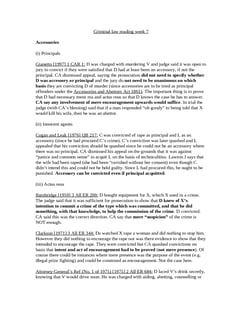A-G for Jersey v Holley [2005] UKPC 23
Judgement for the case A-G for Jersey v Holley
Table Of Contents
A man got drunk and had a row with his girlfriend who he killed. He pleaded provocation to be considered in light of his alcoholoism.
The deputy bailiff asked them to consider if any particular characteristic would have reduced his self control (i.e. alcoholism) which thus excused his reaction to the provocation. However he also said that drunkenness at the time could not be held in his favour since it offered no defence, though it made him more easily provoked: only alcoholism, a disease, could be said to mitigate his reaction.
Thus the question was whether his alcoholism or his drunkeness was what made him react in the way he did.
CA said that the deputy bailiff misdirected, but the HL allowed the AG’s appeal (by 6-3).
-
HL overruled Smith (Morgan James) and revived Lord Diplock’s test and applied Luc Thiet-Thuan. They said that the gravity of provocation could be considered based on what was reasonable for the defendant given his age, sex, etc., but that parliament intended an objective standard for loss of self control on the grounds that:
Parliament had willed it thus and
-
Self-control was an issue of diminished responsibility, not provocation.
(What use is it to take into account that a provocation might be the most serious, anger inducing provocation imaginable if we maintain that self control must be that of a reasonable person, when a reasonable person would not have been provoked?
Provocation and loss of self control are inherently linked: If I am provoked I act in a way that I normally would not, so the courts should just accept that they are applying a harsh, objective test, rather than Lord Diplock’s apparent “compromise” of a subjective test for provocation and an objective test for control (which, incidentally, he simply used in a way that effectively allowed subjective loss of self control, while this court uses it the opposite way. Neither are being true to what the law says, so they might as well go along with the fairer subjective test).
Lord Bingham and Lord Hoffman openly admit that they simply do not like the “reasonable man test” in this instance. They say that Luc Thiet-Thuan was wrongly decided, whereas Smith was correct.
RELATED CASES
For Further Study on A-G for Jersey v Holley
Need instant answers? Our AI exam tutor is here to help.
Ask questions 🙋 Get answers 📔 It's simple 👁️👄👁️
Our AI is educated by the highest scoring students across all subjects and schools. Join hundreds of your peers today.
Get StartedRelated Product Samples
These product samples contain the same concepts we cover in this case.
| Criminal Law | Defences Notes (32 pages) |
| Criminal Law | Defences Short Notes (28 pages) |

 Since 2010, Oxbridge Notes has been a trusted education marketplace, supplying high-quality materials from top achievers at universities like Oxford, Cambridge, LSE, Harvard, and Yale.
Since 2010, Oxbridge Notes has been a trusted education marketplace, supplying high-quality materials from top achievers at universities like Oxford, Cambridge, LSE, Harvard, and Yale.